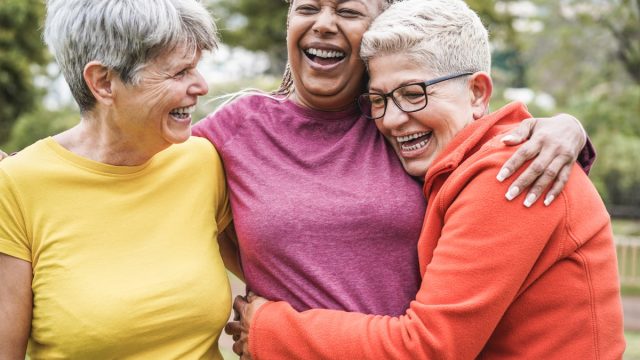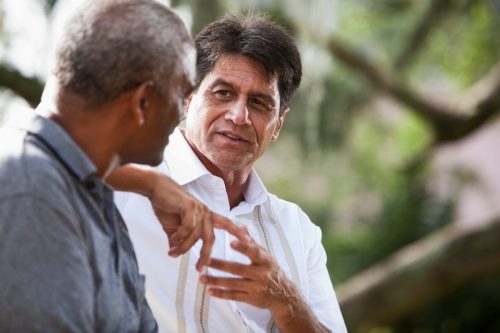This Is the No. 1 Trait That Makes You a Good Friend, Experts Say
Here's what most people are looking for in their friendships.

You've surely made a lot of friends already throughout your life, but you've almost certainly lost several as well. Falling out with a friend can be especially hard, because a friendship is "one of the most important relationships we have in our lives," according to Sofia Celestino, a relationship coach from Destiny Awakens. But while there are a number of reasons why someone might not want to be your friend, much of it boils down to one key problem: They feel you aren't a good friend. So what exactly makes someone a good friend? Talking to therapists and relationships experts, we uncovered the top trait people look for when choosing who they want in their lives. Read on to find out the number one quality that makes you a good friend.
READ THIS NEXT: The Zodiac Sign You Should Be Best Friends With Based on Compatibility.
In general, everyone wants to be friends with people who exhibit positive traits.

When it comes down to it, a "friendship is two-sided," says Justin Larkin, a therapist with the Ohana Luxury Alcohol Rehab in Hawaii. This means you must exhibit some of the positive traits you look for when seeking out friends yourself. After all, if only one person in a friendship is working to bring forth the characteristics of a "good" friend, "then it's not a true friendship," according to Larkin.
"A person who doesn't engage in the friendship equally isn't a good friend," he explains. "Sometimes you have one person doing all of the work in the friendship. This is problematic. We want a friendship that is equal. We want our friends to be there for us as much as we are there for them."
But there is one trait that might stand out above the rest.

While there are many different qualities that can make you a good friend, there is one that may be more important than any other: being a good listener. "The top trait that both ignites and sustains friendships is the ability to listen to one another," says Randi Levin, a transitional life specialist and relationship expert. According to Levin, people often seek this trait from other people because it adds depth to any friendship.
"In a word, this trait is valuable because it is at the root of connection," she says. "Nothing is more valuable in today's world than true connection. Social media has watered down society's definition of friendship, so it is even more important to curate and cultivate strong and continuing friendships that add genuine substance, meaning, and intelligent conversation to your life."
For more friendship advice delivered straight to your inbox, sign up for our daily newsletter.
Good listening involves a lack of judgment.

There's a difference between just listening to someone and being a good listener, however. Heidi McBain, MFT, an online therapist and coach for mothers, says a key component in being a good listener is a lack of judgment. Showing someone that you can be there for them "without judging how they live their lives" makes them feel understood, according to McBain. "People feel safe in a space where they are understood. It is often difficult to find friends who accept rather than judge you," Levin further explains.
She adds, "The ability to listen without interrupting and without the need to overshare your thoughts first is a skillset that is memorable to people. They feel good in your presence, understood and open when interacting with you." But reserving judgment doesn't necessarily mean you have to see eye-to-eye with every decision someone makes.
"Understanding your friends feelings and thoughts does not always mean that you agree with them, but rather that you celebrate them and allow them space to be themselves," Levin says. This means that even if you think your friend is making a mistake, you "resist the urge" to tell them that, says Laura Doyle, a relationship expert with over 20 years of experience. "It might not be a mistake to them. They have their own goals, dreams and desires in life," Doyle explains. "Criticism is a poison pill to any kind of relationship, especially close friendships."
It can also benefit the health of your friends.

Your ability to be a good listener could also have positive health benefits for your friends. A 2021 study published in JAMA Network Open found that the act of surrounding ourselves with friends who actively listen to us when we're talking and venting can actually help build cognitive resilience. The researchers asked more than 2,100 adults to document their levels of socialization through five different types of support: listening, advice, love-affection, emotional support and sufficient contact.
They then measured the participants' cognitive resilience through Magnetic Resonance Imaging (MRIs) and found that participants who reported high levels of supportive listening also showed higher cognitive resilience. That's especially important because low cognitive resilience has been associated with certain diseases that impair brain function and memory, such as Alzheimer's and other types of dementia.





















